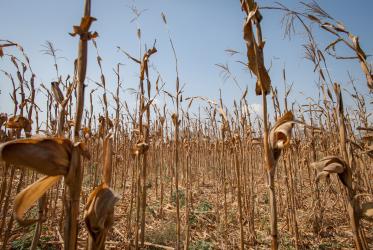Letter to H.E. George W. Bush, President of the USA, 4 September, 2003
(A similar letter was also sent to The Hon. John Howard MP, Prime Minister of
Australia)
Your Excellency,
The World Council of Churches considers the matter of human-induced climate
change as a profound moral issue that has serious implications for our planet. This
climate change is being precipitated primarily by the polluting economies and
lifestyles of the rich nations whose emissions over the past 150 years constitute
about 80% of the increased carbon dioxide concentrations in the atmosphere. The
consequences of climate change will impact disproportionately on the poor developing
nations and on the future generations. For the World Council of Churches,
climate change is not only a matter of international justice but also of inter-generational
justice.
The Central Committee of the World Council of Churches in one of its previous
meetings has observed:
The WCC has always stood in solidarity with those most affected by climate
change. The consequences of climate change further accentuate the deep injustice
already existing between industrialised and developing countries. Weather
anomalies primarily hit the countries of the South, where the majority of the
world's population lives. At the same time, the poor in these countries make only
marginal contributions to total greenhouse gas emissions and they lack the means
to protect themselves against the devastating impact of changing climate conditions.
There is also the lack of political will of leaders of rich countries, who are
the prime producers of greenhouse gases, to take the political and financial respon-
The Central Committee calls on its member churches to ensure that all governments
will sign the Kyoto Protocol and urge for a new round of negotiations for
even stronger regulations.
The World Council of Churches is of the opinion that measures to address global
warming as outlined by your government in July (cf. International Herald
Tribune, 25 July 2003) cannot replace the decisive action of the government of
the United States, a country whose citizens' consumption of energy and requirement
of oil is highest in the world. The US dependence on oil and continued support
for a development model based largely on fossil fuel and less on renewable
energies is of concern to the global community because of its implications for the
environment and for peace and security.
The WCC member churches in the Pacific and its youth constituency have on
several occasions drawn our attention to the influence of the corporate sector on
the decision-making processes. Against this background, the US government's
action to delay the signing of the Protocol is viewed with concern as it does not
take into consideration the greater well-being of people around the globe.
We therefore strongly urge you to reconsider your opposition to the Kyoto Protocol
and to join the broader community of nations that is working collaboratively
through this International Treaty to seriously tackle the threat posed by climate
change.
Respectfully yours,
Rev. Dr Konrad Raiser
General Secretary
sibility for this. The Kyoto Protocol is a first step in a global effort to combat climate
change, but it needs to be followed with stronger efforts.
change as a profound moral issue that has serious implications for our planet. This
climate change is being precipitated primarily by the polluting economies and
lifestyles of the rich nations whose emissions over the past 150 years constitute
about 80% of the increased carbon dioxide concentrations in the atmosphere. The
consequences of climate change will impact disproportionately on the poor developing
nations and on the future generations. For the World Council of Churches,
climate change is not only a matter of international justice but also of inter-generational
justice.
meetings has observed:
change. The consequences of climate change further accentuate the deep injustice
already existing between industrialised and developing countries. Weather
anomalies primarily hit the countries of the South, where the majority of the
world's population lives. At the same time, the poor in these countries make only
marginal contributions to total greenhouse gas emissions and they lack the means
to protect themselves against the devastating impact of changing climate conditions.
There is also the lack of political will of leaders of rich countries, who are
the prime producers of greenhouse gases, to take the political and financial respon-
will sign the Kyoto Protocol and urge for a new round of negotiations for
even stronger regulations.
warming as outlined by your government in July (cf. International Herald
Tribune, 25 July 2003) cannot replace the decisive action of the government of
the United States, a country whose citizens' consumption of energy and requirement
of oil is highest in the world. The US dependence on oil and continued support
for a development model based largely on fossil fuel and less on renewable
energies is of concern to the global community because of its implications for the
environment and for peace and security.
several occasions drawn our attention to the influence of the corporate sector on
the decision-making processes. Against this background, the US government's
action to delay the signing of the Protocol is viewed with concern as it does not
take into consideration the greater well-being of people around the globe.
and to join the broader community of nations that is working collaboratively
through this International Treaty to seriously tackle the threat posed by climate
change.
Rev. Dr Konrad Raiser
General Secretary
change, but it needs to be followed with stronger efforts.


